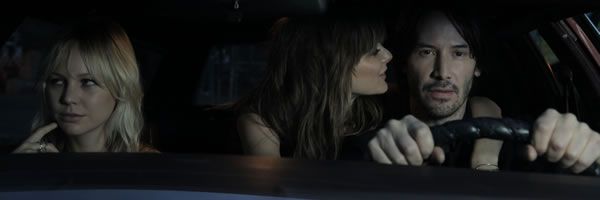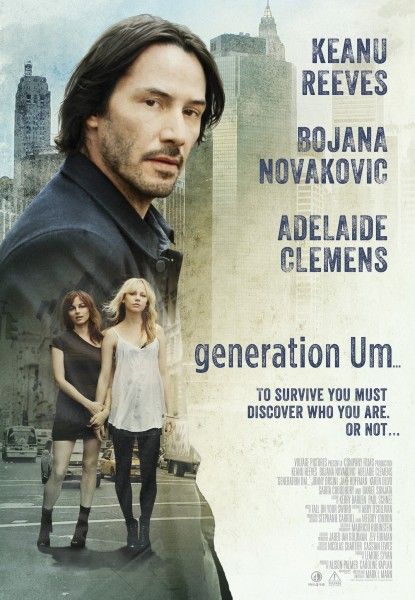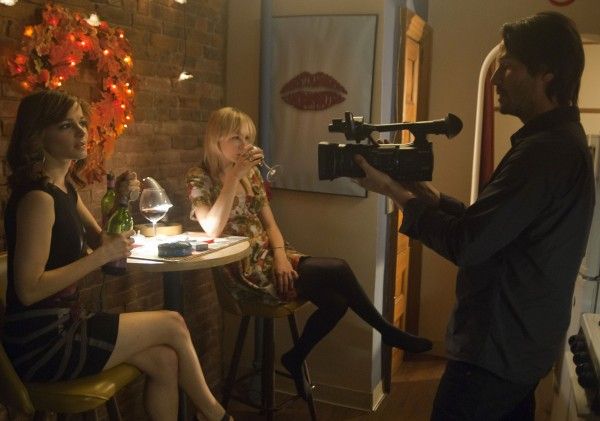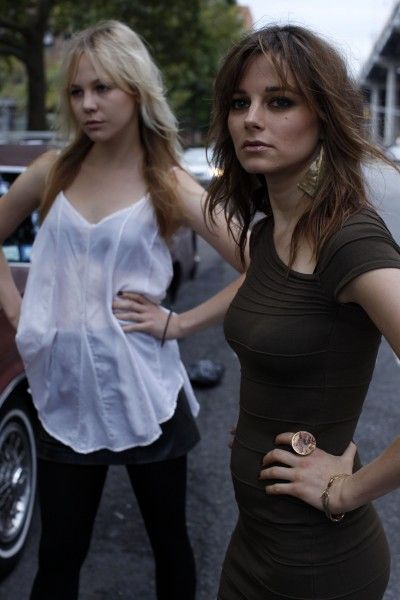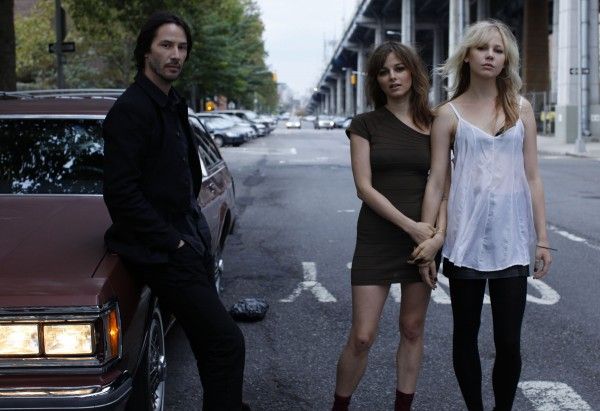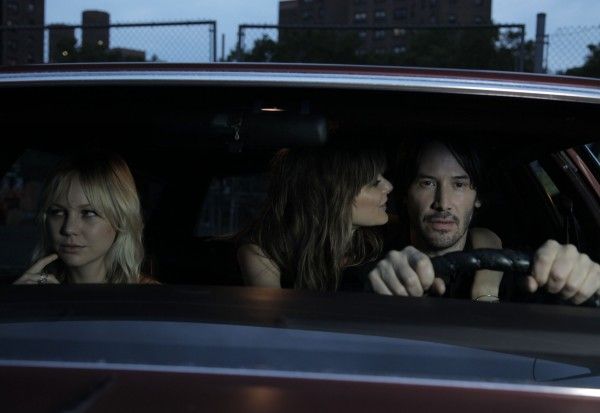Set in present-day downtown New York City, the indie drama Generation Um... follows John (Keanu Reeves), the quiet and withdrawn driver for an escort service that includes Violet (Bojana Novakovic) and Mia (Adelaide Clemens), two women who are as manipulative as they are beautiful. When John impulsively steals a camcorder, he decides to use it to explore their deepest secrets, pushing their friendship to the limit.
At the film’s press day, co-stars Keanu Reeves and Adelaide Clemens spoke to Collider for this exclusive interview about what drew them to Generation Um..., exploring their characters’ backstories during the rehearsal period, whether they worried about making their characters likeable, shooting the fun and playful moments that take place during the credits, and what Mark L. Mann was like, as a director on his first narrative feature. Keanu Reeves also talked about why now was the right time to make his directorial debut, with Man of Tai Chi. Check out what they had to say after the jump.
How did this come about for each of you?
KEANU REEVES: I was given the script by the producer, and loved the script and wanted to meet the writer. So, Alison [Palmer Bourke] introduced me to Mark [L. Mann] and we got along. I said to Mark, “Would you like me to play the role?,” and he said, “Yes.” And I said, “Okay, well, I’d like to make the movie.” And we went off and did the film. I just found the script exceptional – the writing, the context and how the story was being told. That’s how I came on board.
ADELAIDE CLEMENS: It was the same kind of attraction for me. Right off the page, the characters were so multi-faceted and dense. They each had their own speech patterns and rhythms. As an actor, that was just really, really intriguing. Mia was just such a basket case, to me, that I was like, “I wanna try to figure that out.” And the audition process was just so welcoming. Keanu was there, from the first audition, and I thought that was really cool. It was clear that the people involved were very passionate and dedicated, and they were going to put in the time and do it.
Keanu, what was it like to be so involved with the audition process?
REEVES: I was grateful to have that opportunity. That’s really something that would come from the director. Mark L. Mann wanted me to be a part of that, and I wanted to be a part of it. It gave me a chance to work on my side of the character and learn the material, and also to meet Violet and Mia.
Did you just know when you’d found the right actresses?
REEVES: Oh, yeah! There were so many times where that would happen. By the time we ended up being in New York together, it was like, “Okay, here we go!” The individuality and uniqueness of this triangle lived, as artists, as well as in the art. There was a real respect and professionalism, and everybody dug what everybody else was doing. There was just a sense of play.
CLEMENS: I felt so safe within this group.
REEVES: There were no shenanigans. We just rolled up our sleeves.
CLEMENS: We had a rehearsal period, but it was a self-motivated rehearsal period. We were all so enthusiastic and passionate about it.
Did you explore your characters’ backstories during that rehearsal period?
REEVES: Yeah. The director really spoke to each person about their thing. When we would do the scenes, it was more like, “Well, maybe I’ll go here. Let’s go here.” It wasn’t really until the cameras were there that we were doing it.
CLEMENS: It was interesting, the way that Mark directed, because it was so human, in the way that he planted ideas in our heads. That would then direct the other two characters in the scene because they were reacting to that. I thought he was brilliant. It worked.
Mia has some very difficult moments in the film that are disturbingly unemotional. Was that challenging, as an actor, or did you find it fun?
CLEMENS: The ironic thing is that we had so much fun at work. So, as upsetting or horrifying as some of those scenes are, the actual filming process was always very safe and comfortable. Mia’s way of dealing with emotions is that she’s so desensitized.
REEVES: She has that wonderful close-up with that moment when you’re in the mirror, investigating your own body. And then, when you’re telling the story, you don’t know if it’s real or not. There’s a haunted-ness.
CLEMENS: It’s a strange relationship, between her body and herself, and how she perceives her body and what it is, and whether it’s a part of her, and what she can do with it. She’s at a time in her life where she’s between being a girl and a woman, and she shouldn’t be going through that stage in her life, so early. I think she’s just playing. I think that’s why she is confusing. She’s trying to figure it out herself.
Did you worry, at all, about making these characters likeable, or did that not really matter?
CLEMENS: I think honesty is likeable, and vulnerability is attractive. I always try to stay vulnerable. I didn’t worry about it.
REEVES: That’s a director’s problem, really. John becomes the observer, and then you watch other characters through how he’s looking at them. There’s a mystery of who they are and what they’re doing.
CLEMENS: It’s all very mysterious. Sometimes you feel like you want to just shake John, but that’s a really interesting response, as an audience member because you’re sucked in. You want to have a say in it.
There are some really fun moments during the credits, with everyone singing and playing around. Was it fun to have that release, after some of the more intense and emotional scenes?
REEVES: Yeah! It’s the Mark L. Mann magic. I think there’s maybe a handful of lines that were improvised, up until then. Everything was really scripted, but there’s this context of verite. We have that long car shot, at the end, with the three of them, book-ending the morning shot. And then, there’s this scene during the credits, which is so much about the story, in the sense that this bond was created and some window of connection is opened. That scene was completely improvised.
CLEMENS: It was actually amazing. Mark wasn’t even there. He just gave us a camera and said, “We’ve got 20 minutes before wrap. Don’t stop rolling. Just do whatever you want to do.” We’d also been through the journey of the film. I think a lot of the aspects of the film mirror the experience of shooting it.
What was it like to shoot this with such a quick schedule? Do you prefer to work at a fast pace, so that you don’t have time to over think things too much?
CLEMENS: Yeah, I suppose so. I felt like, on this film, it was one of the more exertive rehearsal periods I’ve had, just because it was very intimate and we were all very open. Sometimes the biggest hurdle is just trying to make sure we’re all on the same page and that we’re willing to give of ourselves.
REEVES: It seemed like it was the right amount of time for the picture. I’m sure Mark would say that he could have used a couple more days. But, that was part of the fun of it. It was like, “Just go do it.”
Since this was the first time he’d done a narrative feature, what was Mark L. Mann like to work with, as a director?
CLEMENS: I adored working with him. He knew the characters so well. He even based Mia and Violet on actual people that he knew. I loved how cryptic his direction was.
REEVES: He gave cryptic explanations.
CLEMENS: It was great because you’d go off trying to figure out what he just said and what you wanted to do. And then, they’d call, “Action!,” and you’d be like, “Oh, right, I’ve just gotta swing with it.”
REEVES: I liked him. He wrote the script and he had a vision. He knew what he wanted to do with form and content and with the characters. He had an idea, but he also allowed collaboration. On the day of shooting, he knew what he was looking for and what he wanted to achieve, and directed us accordingly.
CLEMENS: He was also very encouraging. There was never a wrong way to do it. There was a lot of freedom on set, which created that very loose vibe, throughout the film.
Keanu, now that you’ve dabbled in directing, with Man of Tai Chi, do you find it affecting how you approach acting now, or how you work with other directors?
REEVES: You know, I’m still finishing the film, so I can’t really speak to what happens next. But, I would say that working on Generation Um and having the chance to work with the camera certainly informed and helped develop my aesthetic, even going forward, in terms of directing and where to put the camera and stuff.
Why was now the right time to direct?
REEVES: I basically came to a place where I just had a story to tell. So much went into being able to do that and entertain.
Generation Um opens in theaters on May 3rd.

